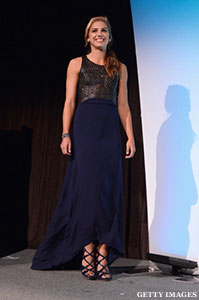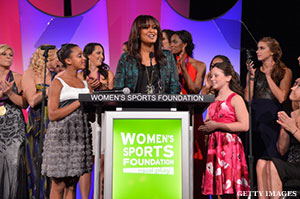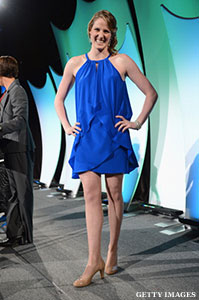
The scene is the Women's Sports Foundation's 33rd Annual Salute to Women in Sports. It's at Cipriani Wall Street, and the event feels even more special in 2012, exactly 40 years after the passage of Title IX. The ballroom is decorated, the red carpet is out, and the athletes are ushering in. As the Olympic soccer star famous for her feet and forehead, Alex Morgan, walks across the carpet, a woman calls out to her, "Hi, Alex, look at this," and shows her a picture of her daughter wearing a Morgan jersey. "She wants to be you so badly."
A little further down the carpet, Jordyn Wieber is calling to her mom, asking her to take a picture of her, Gabby Douglass and 2008 all-around champion Nastia Liukin as they pose in their dresses. The ladies of the U.S. rowing team grasp their gold medals proudly. Paralympic swimmer Jessica Long waves at those watching from the side of the carpet, and Missy Franklin attempts to figure out what kind of dress she's wearing by asking an interviewer to look at her tag for her.
Meanwhile, Women's Sports Foundation founder Billie Jean King walks down the carpet, looking at the athletes who have become inspirations to young girls now, seeing the effect of what she started so many years ago, seeing how her strength, her courage, paved the way for all of this -- for the awards and the dresses and the red carpet and the fans. But mostly, for the athletes, who were inspired by Billie Jean King's courage and are now inspiring those who watch them.

As the Women Sports Foundation's current president, Laila Ali, stands in the center of the red carpet and looks at all of this proudly. The athletic achievements of these women are incredible. But Ali is just as proud of what it means for the young girls to see their role models not only excelling in what was once a male-dominated-sports universe, but also feeling proud of themselves and who they are while doing it.
And that shows through as these women work the red carpet -- they're wearing fancy dresses and their hair is done, and they're walking in heels (or at least attempting to walk; some are wobbling slightly) but they exude an equal amount of confidence when they're out competing in their uniforms and cleats.
"I say this a lot, but young girls out there need to be educated about the fact that the celebrities they always see on magazines, they have trainers," Ali says. "They have airbrushing. They have all these things. And you just shouldn't strive to be that way. That's why it's so great for young girls out there to look at these athletes."

Ali turns her head toward those surrounding her on the carpet and says, "You can see right here that these athletes come in all shapes and sizes. Some of them are lean. Some of us are bulkier or more muscular. But we're all beautiful, confident women."
And for many of these women, that confidence came from sports. They've learned how to embrace who they are, and take what they have, take something that someone else might consider a flaw, and use that to further their game. For five-time Olympic swimming medalist Missy Franklin, who smiles as she autographs items for parents on the side of the carpet, growing up a head above everyone in her grade wasn't something that was easy to deal with.
"I've always been this tall and it was really hard growing up," says Franklin, who is 6-1. "I mean, it makes you different. It makes you stand out."
It wasn't until she started swimming that she realized just how much of an advantage that height was.
"I realized it was a gift," Franklin says. "It helped me succeed at what I love to do. And so I grew to absolutely love it now. It's just the best. I wish I were even taller."

For three-time Olympic medalist Mary Whipple, it's the opposite end of the height spectrum. The 5-3 1/2 (and she says she takes that half inch "very seriously") coxswain says that when she's around her teammates, she doesn't feel short -- even though almost all of her teammates are over 6 feet. She says the confidence her teammates have about themselves transfers over to her.
"I feel like I'm 10 feet tall when I'm around them because of our confidence," Whipple says. "They're much taller than the norm, and yet they put their shoulders back and embrace it. I love them and they love themselves. And so for me, being short -- well, I can work that, too."
Ali says that the heart of solving the problem of body image for young girls is to abandon what others might consider societally normal, and instead focus on what makes you happy.
"I've always been very confident," she says. "If there's something about myself that I want to change, I do the work that it takes to get that way. You have to not be too hard on yourself -- everyone has a different shape and build. You know, I weigh 180 pounds and most people are like, 'oh my God!' But I feel fine!"
Morgan, who was named Sportswoman of the Year for team sport, agrees. She says soccer has taught her a lot about life in general -- how to be patient, how to listen, how to step up when she needs to. And it has taught her to love herself.

"It's important for women to feel confident in their own body, whether they have broad shoulders or big calves, or whatever," Morgan says. "I have big calves and I love showing off my legs because of it. So whether your body is athletic, or skinny, or big-boned, it doesn’t matter. You should love it no matter what.”
That’s the kind of confidence and influence that Morgan, who the WSF named Sportswoman of the Year for a team sport, brings with her everywhere she goes.
It's what defines the spirit of women's sports and these female athletes.
It's what continues to inspire the future faces of women's sports -- and it's why in ten years, the girls out there who want to be Alex Morgan so badly right now will be the ones on this very red carpet, being told by the mothers out there how badly their daughters want to be like them.




